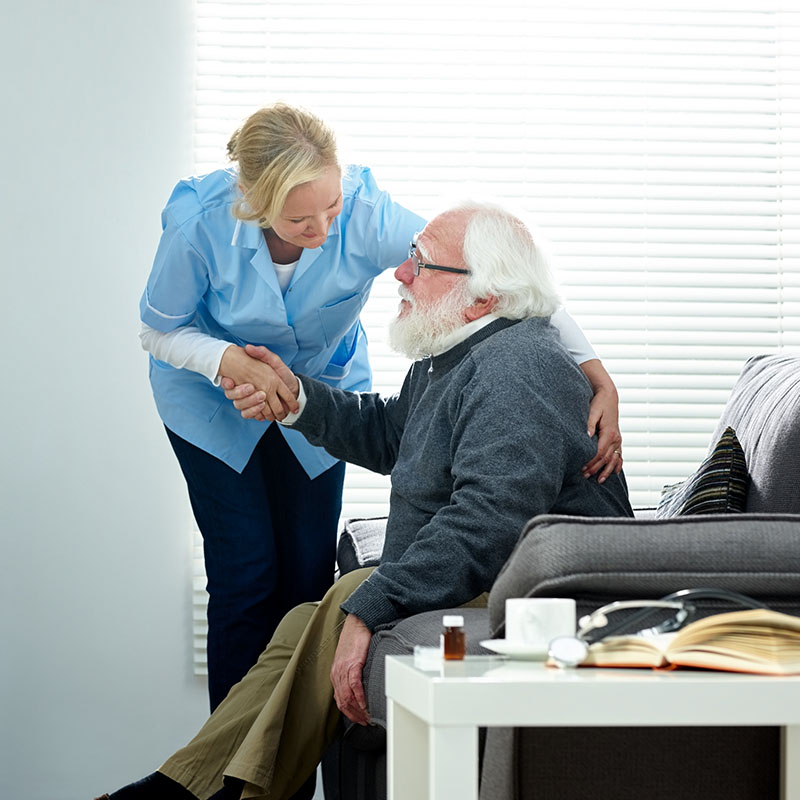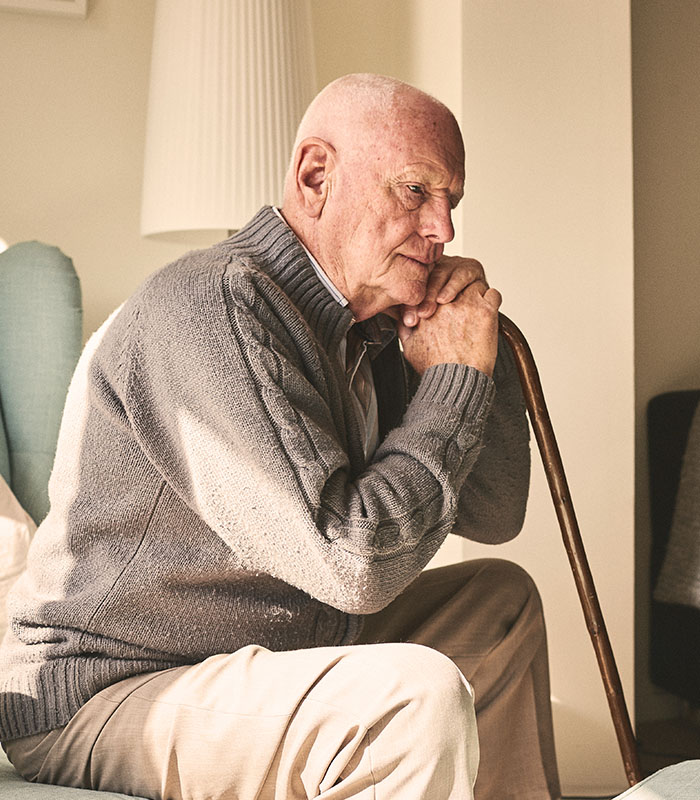Kansas City Elder Abuse Lawyer
Kansas City Elder Abuse Attorneys
Seeking Justice for Victims of Elder Abuse & Their Families
Elder abuse can and does occur in all types of settings, including nursing homes, long-term care facilities, and other types of community living settings. It can also occur at the hands of private caregivers, as well as trusted family members and friends. At the Law Office of Tom Wagstaff Jr., we believe that all forms of elder abuse are unacceptable. Our Kansas City elder abuse attorneys are committed to protecting the rights of our society’s most vulnerable individuals, as well as holding abusers accountable.
If you believe that you or someone you love has been the victim of senior abuse, reach out to our team today to learn how we can help. Call 816-708-0524 or contact us online to request a free and confidential consultation.

What Is Elder Abuse?
Generally speaking, elder abuse is the mistreatment of people 60 years old and older. “Mistreatment” is a broad term that refers to many different types of abuse, neglect, and exploitation.
Although elder abuse is often synonymous with nursing home abuse, elder abuse does not always take place in nursing homes and other long-term care facilities. In-home caregivers, friends, and even trusted family members can all commit acts of elder abuse.
In fact, family members are the most common perpetrators of elder abuse, according to the National Council on Aging.

Common Types of Elder Abuse
There are several different types of elder abuse, including physical abuse, such as hitting, slapping, shoving, pinching, or forcefully grabbing. Neglect, including neglect of basic, nutritional, medical, emotional, and social needs. Psychological abuse, including yelling, belittling, threatening, harassing, and intimidating. Confinement, including physical or chemical (medical) restraint and isolation. Sexual abuse, including rape, attempted rape, forced sexual acts, and groping. Willful deprivation of medical attention, medications, shelter, food, and other necessities. Financial exploitation, including misusing, withholding, or stealing money or property.
All of these types of abuse can have a devastating impact on the victim, including significant physical, mental, emotional, and financial harm. In severe cases, certain forms of abuse may even lead to wrongful death.
Elder Abuse Warning Signs
It is important that family members and loved ones know the signs of elder abuse so that they can take immediate action at the first sign that something is wrong. Seniors may be unable or unwilling to speak up for themselves, or they may be unaware that what is occurring constitutes abuse. Some of the most common warning signs of elder abuse include:
- Unexplained injuries
- Bedsores
- Falls and other preventable accidents
- Malnutrition or dehydration
- Changes in mood or behavior
- Rapidly declining physical or mental health
- New or worsened depression, anxiety, irritability, aggression, etc.
- Sudden bouts of crying
- Untreated illnesses and infections
- Medication errors
- Changes in financial situation
- New concerns about money
- Unexplained withdrawal from bank accounts
- Bounced checks
- Changes to a will, trust, or power of attorney
- New sexually transmitted infections (STIs)
- Injuries to the groin, upper thighs, genitals, or female breasts
- Apparent fear of a certain individual or caregiver
- Unwillingness to be alone with someone
- Dirty or soiled clothing or bedding
- An unclean or unsanitary environment
If you suspect that your elderly loved one is being mistreated by a caregiver or loved one, or if you simply feel that something is not right, contact the appropriate authorities right away. If you believe that someone is in imminent danger, call 911. Otherwise, you may report known or suspected elder abuse to local law enforcement, the state agency in your area, your local long-term care ombudsman, or another trusted authority.
Impact of Elder Abuse
The impact of elder abuse can be profound and far-reaching, affecting the physical, psychological, emotional, and financial well-being of older adults. Here’s a breakdown of the various impacts:
Elder abuse can result in physical injuries ranging from bruises and cuts to fractures and internal trauma. These injuries may lead to chronic pain, disability, and decreased mobility, compromising the older adult's ability to perform daily activities independently.
Elder abuse often causes significant psychological distress, including feelings of fear, helplessness, and shame. Victims may experience anxiety, depression, post-traumatic stress disorder (PTSD), and other mental health issues as a result of the trauma they've endured.
Elder abuse erodes the older adult's sense of trust and security, particularly when the abuse is perpetrated by someone they know and trust, such as a family member or caregiver. This betrayal can lead to feelings of betrayal, betrayal, and social isolation, exacerbating the emotional toll of the abuse.
Financial exploitation is a common form of elder abuse and can have devastating consequences for older adults. Victims may suffer significant financial losses, including depletion of savings, theft of assets, fraudulent use of credit cards, and manipulation of financial accounts. This can jeopardize their financial security, leaving them unable to afford basic necessities such as housing, food, and healthcare.
The stress and trauma of elder abuse can have serious implications for the victim's physical health, exacerbating existing medical conditions and increasing the risk of new health problems. Chronic stress associated with abuse can weaken the immune system, leading to a higher susceptibility to infections and other illnesses.
Elder abuse significantly diminishes the quality of life for older adults, undermining their sense of dignity, autonomy, and self-worth. Victims may withdraw from social activities, lose interest in hobbies and interests, and experience a diminished sense of purpose and fulfillment in life.
Studies have shown that elder abuse is associated with an increased risk of mortality among older adults. Victims of abuse are more likely to experience premature death due to the direct effects of the abuse, as well as the indirect consequences, such as deteriorating physical and mental health.
How to Prevent Elder Abuse
Preventing elder abuse for your loved one requires a combination of awareness, vigilance, and action. Here are some steps you can take:
- Educate Yourself: Learn about the different forms of elder abuse, including physical, emotional, financial, and neglect. Understand the signs and symptoms associated with each type of abuse.
- Stay Connected: Regular communication with your loved one is essential. Isolation can make elders more vulnerable to abuse. Make an effort to stay connected through phone calls, visits, or video chats.
- Know Their Caregivers: If your loved one receives care from caregivers, whether they’re family members, hired caregivers, or staff in a facility, get to know them. Establishing a relationship with these individuals can help build trust and provide you with insights into your loved one’s care.
- Monitor Finances: Keep an eye on your loved one’s financial transactions and statements. Look for any unusual activity, such as sudden large withdrawals, changes in spending patterns, or unauthorized transactions. Consider setting up automatic alerts with their bank to notify you of any suspicious activity.
- Create a Support System: Build a network of trusted friends, family members, or professionals who can assist in caring for your loved one. This network can help share the responsibility and provide additional oversight.
- Encourage Independence: Encourage your loved one to maintain their independence and decision-making abilities for as long as possible. Empowering them to make choices about their own care and finances can help reduce their vulnerability to abuse.
- Address Health Needs: Ensure that your loved one receives regular medical check-ups and has access to appropriate healthcare services. Addressing their physical and mental health needs can help prevent situations where they may become more susceptible to abuse.
- Be Observant: Pay attention to any changes in your loved one’s behavior, physical condition, or living environment. Trust your instincts if something doesn’t seem right and investigate further if necessary.
- Report Suspected Abuse: If you suspect that your loved one is being abused, take action immediately. Contact local authorities, adult protective services, or organizations dedicated to preventing elder abuse for assistance and support.
- Promote Legal Protections: Advocate for legal protections for elders in your community. Support legislation and initiatives aimed at preventing elder abuse and improving the safety and well-being of older adults.

When to Hire an Elder Abuse Lawyer
Those who mistreat, abuse, or exploit seniors and other vulnerable individuals should be held accountable. By filing an elder abuse lawsuit, you can seek justice and work to recover fair financial compensation for your related damages, such as medical expenses, financial losses, pain and suffering, emotional distress, and more. However, these are complex cases, and it is important that you work with a knowledgeable attorney.
At the Law Office of Tom Wagstaff Jr., our Kansas City elder abuse attorneys have more than 25 years of legal experience, as well as a long track record of success. We dedicate the majority of our practice—including most of our resources and skill—to this area of law. Our team can help you navigate the legal process and fight for every penny you are owed. We encourage you to act quickly, as your time to file an elder abuse lawsuit is limited. Kansas and Missouri both have statutes of limitations on these types of cases; if you wait too long, you could lose your right to pursue damages.
Schedule a Free Consultation With Our Team Today
The Law Office of Tom Wagstaff Jr. offers a highly personal approach, characterized by compassionate legal counsel and one-on-one attorney-client communication. We are attentive to the concerns of our clients, as well as the unique nuances of each individual case. By intentionally limiting our overall caseload, we are able to provide every client with the attention, care, and dedication they deserve.
We do not collect any legal fees unless we win your case. If we do not recover a settlement or verdict for you, you do not pay. Give us a call at 816-708-0524 or contact us online to request a free case review from our Kansas City senior abuse attorneys.
